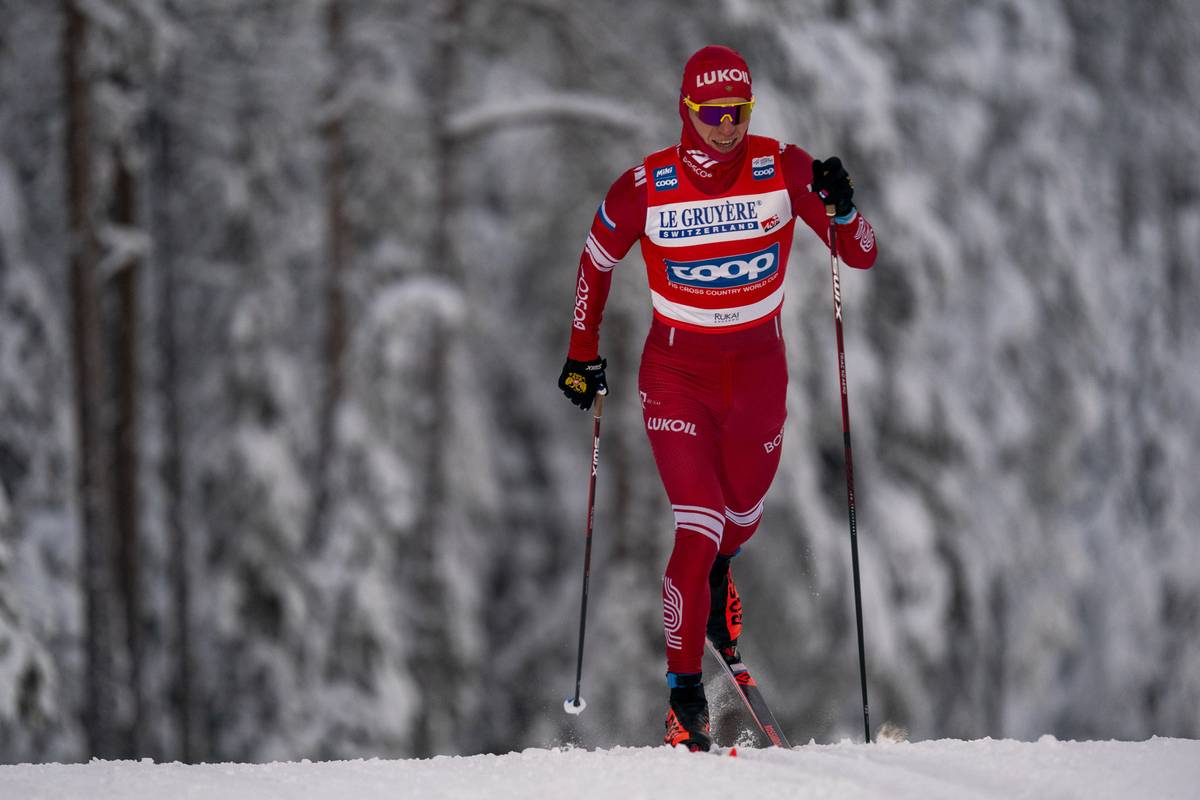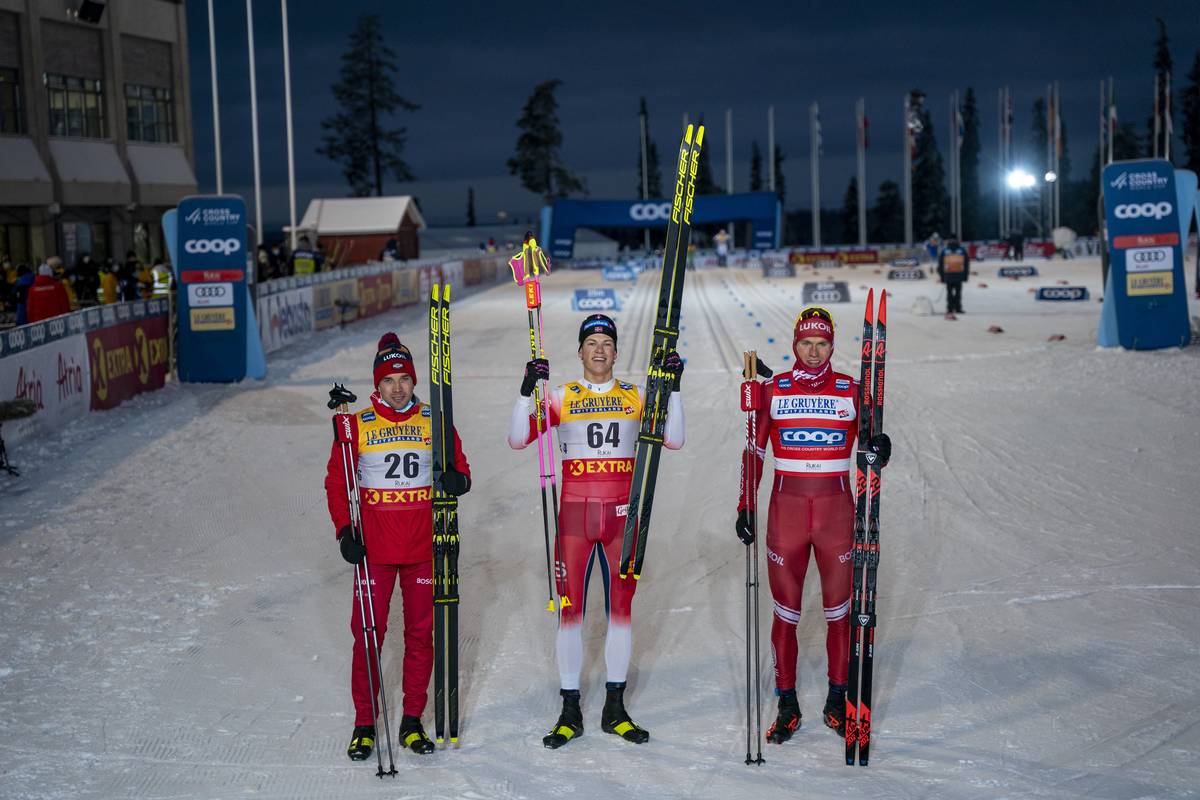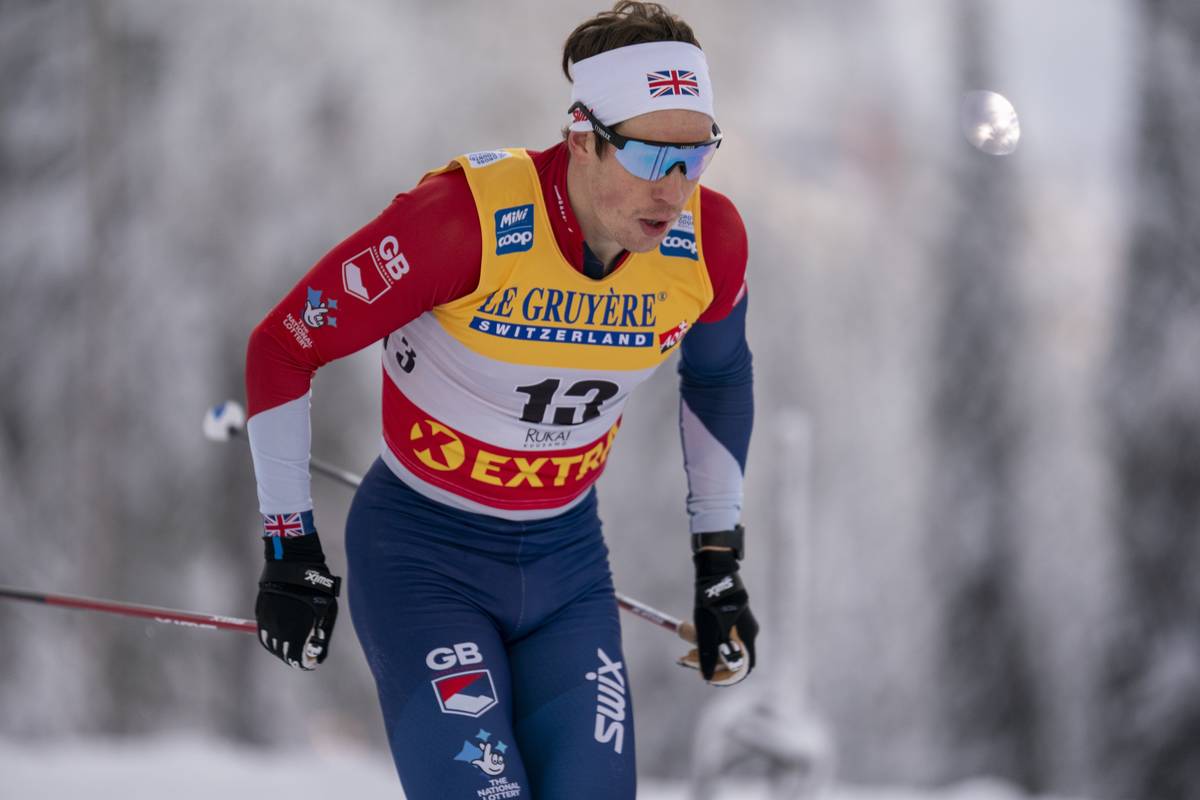
This World Cup coverage is made possible through the generous support of Marty and Kathy Hall and their A Hall Mark of Excellence Award. To learn more about A Hall Mark of Excellence Award or to learn how you can support FasterSkier’s coverage please contact info@fasterskier.com.
A spicy rivalry in sports just heightens the tension. Although Norway’s Johannes Høsflot Klæbo has achieved wunderkind status, last season his prowess was usurped by a stronger Alexander Bolshunov from Russia. At 24 and 23 years old, respectively, Klæbo and Bolshunov are two era-defining skiers. In 2019-2020, although Klæbo remained the king of sprinting, Bolshunov had Klæbo’s number in distance events and won the overall World Cup.

It’s early early early. However, two races into the season Klæbo appears Ferrari-tuned in both sprints and the longer grinds. Although placing second in Friday’s sprint was perhaps a less than special season start, it was not inauspicious for Klæbo.
Starting in bib 64, Klæbo was handed several key data points on Saturday, in terms of pacing, by those beginning ahead of him. Iivo Niskanen, a Finn who wins mostly in Finland and 15 k classics too, began in bib 37. Emil Iversen of Norway began in bib 42. Russia’s Alexey Chervotkin was way early in bib 26.
Bolshunov, considered by many the athlete to surpass Klæbo on the day, began two bibs later, in bib 66.
Time was on Klæbo’s side. With a smooth stride and glide on a cold-snow firm-track day, Klæbo posted the fastest times at every intermediate split and won the race in 34:04.6 minutes. Bolshunov was no foil as he eked within 9.6 seconds at 5 k, yet he bled another 10 seconds on the second lap. He placed third overall 18 seconds behind. Turns out, on this day, knowing Klæbo’s splits two bibs ahead, was of no assistance for Bolshunov. Sometimes the finicky tuning of the Ferrari outpaces the Lambo. (I drive a Prius, so take that for what it’s worth.)
Second place went to Chervotkin (25), for his best individual result on the World Cup and his first podium. He placed fourth in the 2018 Falun 15 k classic and fifth in Lenzerheide’s 2017 15 k classic. (Yup, there’s a pattern.)

In any event, you’ll note in the FIS interview below, that Klæbo appears to be suppressing a big genuine smile post-race. The distance event throne had eluded Klæbo since last year’s Tour de Ski when he won the 15 k classic mass start in Val di Fiemme. He did that with a little naughty stare back at a trio of chasing Russians as he finished. For someone so thirsty for the win and used to drinking from the well in big gulps, that victory was way back on January 3, 2020. Consider that timespan a distance race drought for the Norwegian superstar. The thirst has been momentarily quenched.
Setting up a tasty treat for tomorrow’s 15 k freestyle pursuit is this: Klæbo starts 16 seconds ahead of Bolshunov, who sits second overall, and 21 seconds ahead of teammate Emil Iversen. No way does Iversen assist Bolshunov in catching Klæbo. Or maybe he does. The World Cup drama in Ruka continues to unfold.
There’s no doubt, the U.S. men’s team is transitioning to a younger squad. There remains promise. Just yesterday, JC Schoomaker nearly qualified in Friday’s sprint while Gus Schumacher posted up with a 43rd place. They are both 20 years old.
In the 15 k classic, Schumacher raced to his best World Cup result to date with a 39th place, 1:56.3 off Klæbo’s time. With the tight splits of the men’s field, as they say, every second counts. Coming through 13.1 k, Schumacher was positioned 47th. At the time, nearly 10 seconds off of the 39th spot. In the closing moments, he was able to advance considerably in the standings.
Tomorrow’s 15 k skate pursuit should be interesting for Schumacher. He starts in bib 41, two seconds after Norway’s Simen Hegstad Krüger in bib 40. Krüger should be an excellent early season pacing chess-piece for Schumacher: outside of a single classic race time of day win, Krüger has won two 15 k skates and one 10 k skate on the World Cup. He’s also the 2018 Olympic champ in the 30 k skiathlon.
Post-race interview about the men’s side with U.S. Ski Team Head Coach Matt Whitcomb

Scott Paterson was the next best-placed American in 53rd (+2:20.5). Simi Hamilton finished 55th (+2:30.2), Kevin Bolger 62nd (+3:01.6), Logan Hanneman 66th (+3:28), and Schoonmaker 75th (+4:38.7).
The in-form Brits are not to be missed. Andrew Musgrave placed sixth overall, 32.8 seconds out, while his teammate Andrew Young raced to 16th (+1:05.7).
Racing continues for the men with a 15 k skate pursuit on Sunday.
15 k classic Results | Standings after Day 2

Jason Albert
Jason lives in Bend, Ore., and can often be seen chasing his two boys around town. He’s a self-proclaimed audio geek. That all started back in the early 1990s when he convinced a naive public radio editor he should report a story from Alaska’s, Ruth Gorge. Now, Jason’s common companion is his field-recording gear.





